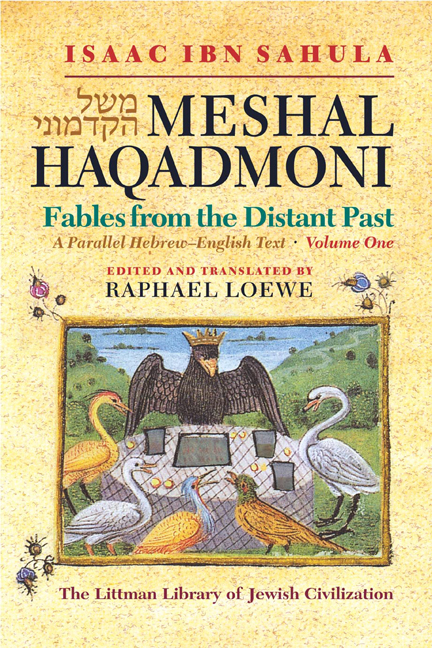Book contents
- Frontmatter
- Epigraph
- Publisher’s Note
- The Illustrations
- Preface
- Contents
- List of Abbreviations
- Introduction
- MESHAL HAQADMONI
- Part I On Wisdom
- Part II On Penitence
- Part III On Sound Counsel
- Part IV On Humility
- Part V On Reverence
- Appendices
- Bibliography
- Index of Citations
- Index of Key Hebrew Terms
- Index of Subjects
Preface
- Frontmatter
- Epigraph
- Publisher’s Note
- The Illustrations
- Preface
- Contents
- List of Abbreviations
- Introduction
- MESHAL HAQADMONI
- Part I On Wisdom
- Part II On Penitence
- Part III On Sound Counsel
- Part IV On Humility
- Part V On Reverence
- Appendices
- Bibliography
- Index of Citations
- Index of Key Hebrew Terms
- Index of Subjects
Summary
IF, as the Gospels state, no man can serve two masters (Matt. 6: 24), it is surely a hopeless task to address several types of reader in a scholarly work: and this book has perhaps as many as five classes in mind. Specialists in Jewish studies ought not to require translations from Hebrew, of whatever period, and those properly equipped would doubtless be able to gather for themselves the information that I have put into the Introduction and notes; I claim no more than to have saved them some donkey-work. But the annotation has had to provide also for the needs of students who cultivate disciplines other than Hebrew—medieval Spanish history and folklore—for whom Ibn Sahula's Fables may be of relevance, conceivably of importance: and what is provided by way of elucidation for non-hebraists will, it is hoped, also be of help to those students of Hebrew—alas, nowadays the majority—who shrink almost in terror from medieval texts. Historians and folklorists in a hurry may grudge the time necessary to wade through my verse rendering, and for such the fairly full synopses in the Introduction (Section 2) may serve to identify the passages which they feel merit closer reading. The metrical English version endeavours, as explained in the Introduction (Section 10), to do justice to Ibn Sahula's literary form, and may serve to open the eyes of readers without any Hebrew to the existence both of a literary genre and of a thirteenth-century satirist who, in my opinion, may stand comparison with Jonathan Swift. As regards those who may be termed, without condescension, amateur readers, whose Hebrew limps, if the translation tempts or goads them into learning enough to dispense with it, it will have justified itself.
I would probably not have embarked on the translation of the Meshal haqadmoni but for the circumstance that the miniatures in the text included in the Rothschild Miscellany manuscript in the Israel Museum inspired the interest of Linda Falter, who wanted to know more about it; and I am grateful to her and her husband, Michael, for help in various ways in connection with my work.
- Type
- Chapter
- Information
- Meshal Haqadmoni: Fables from the Distant PastA Parallel Hebrew-English Text, pp. ix - xPublisher: Liverpool University PressPrint publication year: 2004

